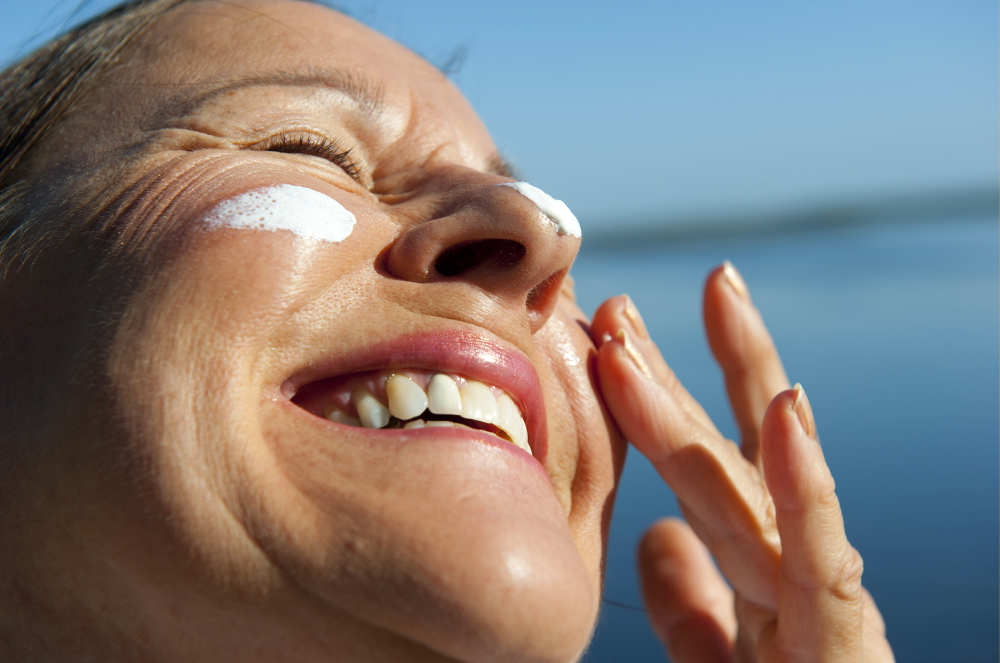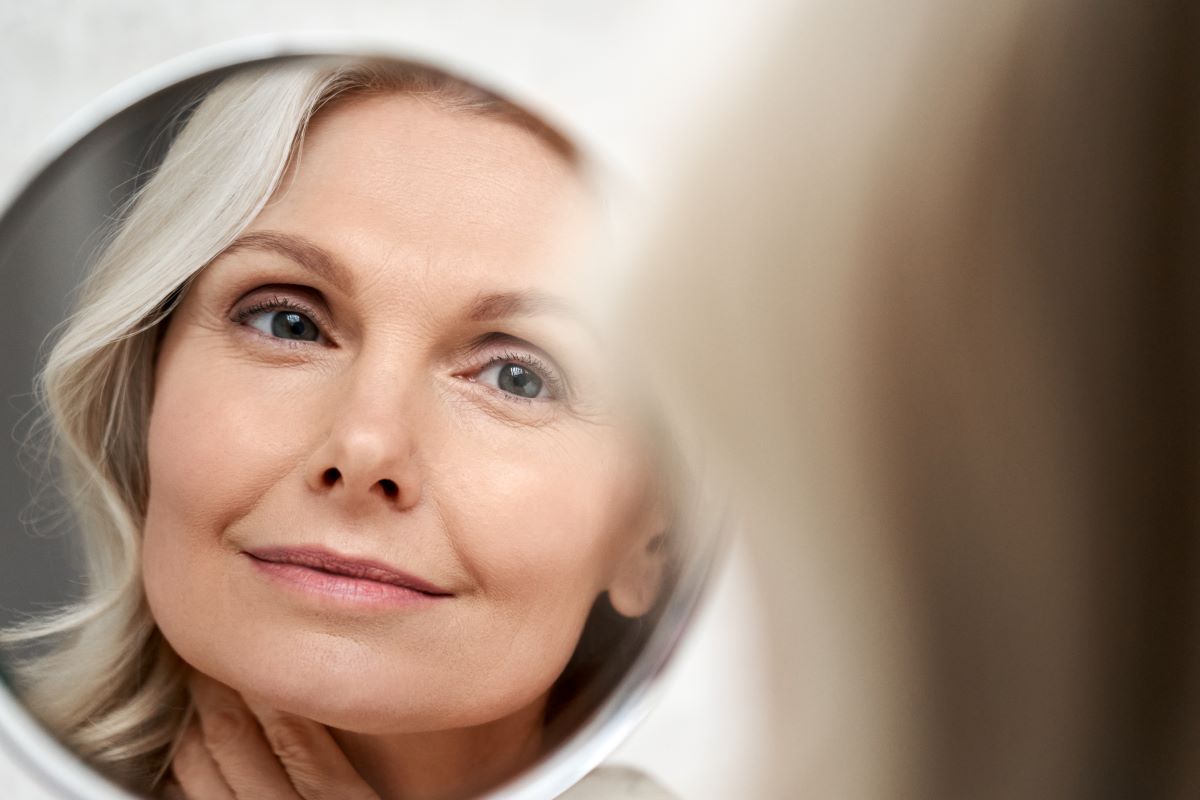Ask A Dermatologist: How Do I Care For Menopausal Skin?

Link to share article here:
Skin-Ageing 101 – Plus, Five Factors That Affect Skin-Ageing
We can’t reverse the clock but when it comes to slowing accelerated signs of skin-ageing, it’s never too late for a bit of damage limitation.
Much like the ancient saying about planting a tree. The best time to sow the seed (ergo take action around an ageing-skin condition) was years ago. The second best time is today.
Now Skin + Me are all about celebrating real, healthy skin. We understand that ageing is a byword for living life. The key here is to look and feel energised. To positively age well.
The work we do to accept ourselves is ongoing but if you’re facing a visible loss of vitality in your skin, then hopefully you’re at a stage where you’re confident enough to take less time in the mirror every day.
You don’t want to ruminate on how to freeze time. You’re liberated from unrealistic standards of perfection. You’ve finally worked out your skin type (hint: It evolves as your life stage does), you know what skincare works for you and the routine you like to follow.
You’re also curious about innovations in modern skincare and what they can do for you. Hero ingredients like retinoids (shout out, tretinoin), niacinamide, shea butter and hyaluronic acid are on your radar.
How to be proactive if you want to be savvy about skin-ageing? We’ve got you. A personalised solution packed with bespoke actives, and switching up your routine to include a hydrating cleanser and rich moisturiser is a start.
We distil skin-ageing into simple categories to help you make the most informed decisions when it comes to happy, healthy skin now, and in the years to come.
Five factors that affect skin-ageing
SUN EXPOSURE
Dermatologists are unanimous. The most prolific aggressor when it comes to signs of accelerated skin-ageing is damaging UVA and UVB ultraviolet light from the sun.
Practising safe suncare is the bottom line. That’s covering up or seeking shade when the sun is at its most powerful, wearing protective layers and a hat. Never forget sunscreen. Whether you choose a chemical or mineral sunscreen formulation, make reapplying an SPF of 30+ part of your daily routine.
Remember that sun damage increases your risk of developing melanoma and non-melanoma skin cancers. It can deepen lines, create wrinkles, and damage skin elasticity giving a dull, rough-textured appearance. It can also increase pigmentation (especially for those susceptible to melasma).
Consultant Dermatologist, Dr Malvina Cunningham explains we need to remember the reality of what’s being signalled by the skin when you get a suntan, “Although there is a perception that tanned skin is healthy skin it is actually a marker of damage.”
“Although there is a perception that tanned skin is healthy skin it is actually a marker of damage.”
Still can’t give up the bronzed look? Fake it to make it, your skin will thank you.
Genetics vs. Lifestyle
We’ve grouped these two together. Why? Because it’s useful to think of genetics and lifestyle as separate sides of the same weighing scale.
Imagine on one side of your scale you have your genetic makeup, and you can’t control that (thanks mum). Luckily, on the other side of the scale is your lifestyle.
On the side of lifestyle, you have complete agency about the decisions you make that will affect your skin. It’s up to you to tip the balance in favour of ageing well.
Dr Malvina Cunningham explains the value of the right lifestyle and routine to nurture and protect your skin, “Lifestyle is important and the influence our environment and our general health has on our skin can’t be emphasised enough. Our skin shields us from the environment which is constantly attacking it, whether it’s UV light, pollution or the climate. Maintaining that health is about daily care – a routine you can have control over.”
Daily care in this instance is about a holistic approach. Safe sun care, a nutritious balanced diet, staying active, cutting back on diuretics like caffeine and alcohol. The right routine for your skin type. Zero smoking and less exposure to pollution.
You have complete agency about the decisions you make that will affect your skin.
You’re probably already aware of the ‘how to be sensible’ guidebook here. Remember though, to keep expectations realistic. Stay mindful of what healthy skin actually looks like at every life stage. Check in on your personal progress photos, be self-compassionate and repeat after us that life is about making the most of what you’ve got in that moment – not holding back a smile to avoid laughter lines.
Environmental stressors
Your skin needs to be in tip-top condition to best protect you from environmental stressors. That includes the sun but also from pollution and challenging climate changes.
City life is a big culprit here. Step outside your home and your skin is exposed to traffic exhaust emissions such as nitrogen dioxide and microparticles of particulate matter.
Skin is porous enough to be vulnerable to external aggravators like chemicals in the atmosphere and microparticles in the air.
Dr Malvina Cunningham explains, “Pollution increases oxidative stress and decreases antioxidant defence. In turn, this leads to an impaired skin barrier, damage and inflammation which can trigger acne flare-ups and inflammatory skin conditions such as eczema.”
Your skin needs to be in tip-top condition to best protect us from environmental stressors.
If you’re looking to negate this and associated signs of ageing, make skin barrier protection your ace card. A well-functioning skin barrier is essential to the health of our skin. Your routine can nurture it by ensuring skin is gently cleansed, hydrated and protected. Don’t overuse active ingredients and look for barrier-loving ingredients in your products – think glycerin, shea butter, allantoin and ceramides (tip: You’ll find these in Skin + Me’s Cleanser and Moisturiser sets.)
Hormonal changes triggered by the menopause
Changes brought on by fluctuating hormone levels at every stage of our lives can show up on our skin – premenstrual acne breakouts are a common example.
A reminder here that the skincare rollercoaster doesn’t stop when it comes to the menopause. Typically starting from your mid-40s onwards, it’s not just your period that’s affected. Menopause also plays a big role in skin-ageing because our oestrogen levels dramatically drop during this time. Oestrogen receptors – found on the skin – play a role in many of your skin’s restorative processes and affect our collagen levels. We lose almost 30% of our collagen within the first few years of menopause. Cue skin dryness, an increase in skin thinning, impaired wound healing, and a noticeable decrease in skin elasticity.
Menopause also plays a big role in skin-ageing because our oestrogen levels dramatically drop during this time.
How to manage these changes? An effective age-well skincare routine consisting of key ingredients such as retinoids (like the tretinoin that may be contained in your personalised solution) is key. Focus on replenishing and soothing your skin barrier, without clogging your pores.
If you’re living through the menopause and on your Skin + Me journey, we recommend enhancing your routine with our Purify + Prep Hydrating Cleanser and soothing your skin post-cleanse and treatment with our restorative Soothe + Smooth Rich Moisturiser.
Make a sprinkling of knowledge, a beautiful attitude and a smart routine your secret to ageing well. Happy days.
Medical facts checked by Head of Medical, Dr Jason Thomson.
New to Skin + Me? Get your first month of personalised skincare for £4.99 with promo code DOSE – complete our quick consultation here.
Looking for a routine refresh? Add the Dream Routine to your Skin + Me subscription.
In need of a restock? Head to The Skincare Shop for one-off purchases of your Routine Essentials.

